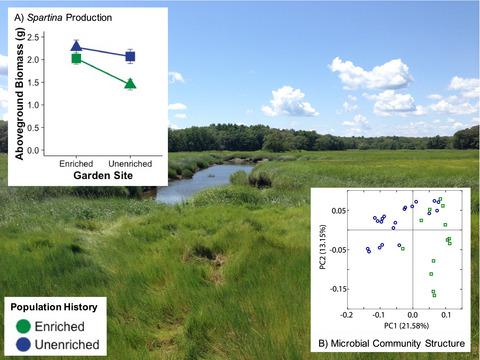Our official English website, www.x-mol.net, welcomes your
feedback! (Note: you will need to create a separate account there.)
Short- and long-term effects of nutrient enrichment on salt marsh plant production and microbial community structure
Journal of Ecology ( IF 5.3 ) Pub Date : 2021-08-03 , DOI: 10.1111/1365-2745.13756 Torrance C. Hanley 1, 2 , Jennifer L. Bowen 1 , Patrick J. Kearns 3 , A. Randall Hughes 1
中文翻译:

养分富集对盐沼植物生产和微生物群落结构的短期和长期影响
更新日期:2021-08-03
Journal of Ecology ( IF 5.3 ) Pub Date : 2021-08-03 , DOI: 10.1111/1365-2745.13756 Torrance C. Hanley 1, 2 , Jennifer L. Bowen 1 , Patrick J. Kearns 3 , A. Randall Hughes 1
Affiliation

|
- Nutrient enrichment impacts ecosystems globally. Population history, especially past resource environments, of numerically dominant plant species may affect their responses to subsequent changes in nutrient availability. Eutrophication can also alter plant–microbe interactions via direct effects on associated microbial communities or indirect effects on dominant species’ biomass production/allocation as a result of modified plant–soil interactions.
- We combined a greenhouse common garden and a field reciprocal transplant of a salt marsh foundation species (Spartina alterniflora) within a long-term, whole-ecosystem, nutrient-enrichment study to determine whether enrichment affects plant production and microbial community structure differently depending on plant population history. For the greenhouse portion, we collected 20 S. alterniflora genotypes—10 from an enriched creek that had received elevated nutrient inputs for 10 years and 10 from an unenriched reference creek—and reared them in a common garden for 1 year. For the field portion, we conducted a 2-year, fully crossed reciprocal transplant experiment with two gardens each at the enriched and unenriched sites; we examined the effects of source site (i.e. population history), garden site and plant genotype.
- After 2 years, plants in enriched gardens had higher above-ground biomass and altered below-ground allocation compared to plants in unenriched gardens. However, performance also depended on plant population history: plants from the enriched site had decreased above-ground and rhizome production compared to plants from the unenriched site, most notably in unenriched gardens. In addition, almost all above- and below-ground traits varied depending on plant genotypic identity.
- Effects of nutrient enrichment on the associated microbial community were also pronounced. Following 1 year in common garden, microbial community structure varied by plant population history and S. alterniflora genotypic identity. However, at the end of the reciprocal transplant, microbial communities differed primarily between enriched and unenriched gardens.
- Synthesis. Nutrient enrichment can impact plant foundation species and associated soil microbes in the short term. Most importantly, nutrient enrichment can also have long-lasting effects on plant populations and associated microbial communities that potentially compromise their ability to respond to changing resource conditions in the future.
中文翻译:

养分富集对盐沼植物生产和微生物群落结构的短期和长期影响
- 营养丰富影响全球生态系统。数量上占优势的植物物种的种群历史,尤其是过去的资源环境,可能会影响它们对随后的养分可用性变化的反应。富营养化还可以通过对相关微生物群落的直接影响或对优势物种的生物量生产/分配的间接影响来改变植物 - 微生物的相互作用,这是由于植物 - 土壤相互作用的改变。
- 我们在一项长期、全生态系统、营养丰富的研究中,将温室公共花园和盐沼基础物种(互花米草)的田间互惠移植相结合,以确定富集是否对植物生产和微生物群落结构的影响因植物而异人口史。对于温室部分,我们收集了 20株互花米草基因型——10 个来自已接受了 10 年营养输入的富集小溪和 10 个来自未富集的参考小溪——并在公共花园中饲养了 1 年。对于田间部分,我们进行了为期 2 年的完全交叉互惠移植实验,在富集和非富集地点各有两个花园;我们检查了来源地点(即种群历史)、花园地点和植物基因型的影响。
- 2 年后,与未富集花园中的植物相比,富集花园中的植物具有更高的地上生物量和改变的地下分配。然而,性能还取决于植物种群历史:与来自未富集地的植物相比,来自富集地的植物的地上和根茎产量减少,尤其是在未富集的花园中。此外,几乎所有的地上和地下性状都因植物基因型身份而异。
- 营养丰富对相关微生物群落的影响也很明显。在普通花园中1年之后,微生物群落结构因植物种群历史和互花米草基因型身份而异。然而,在相互移植结束时,微生物群落主要在富集和非富集花园之间不同。
- 合成。营养丰富会在短期内影响植物地基种类和相关的土壤微生物。最重要的是,营养丰富也可能对植物种群和相关微生物群落产生长期影响,这可能会损害它们在未来应对不断变化的资源条件的能力。










































 京公网安备 11010802027423号
京公网安备 11010802027423号